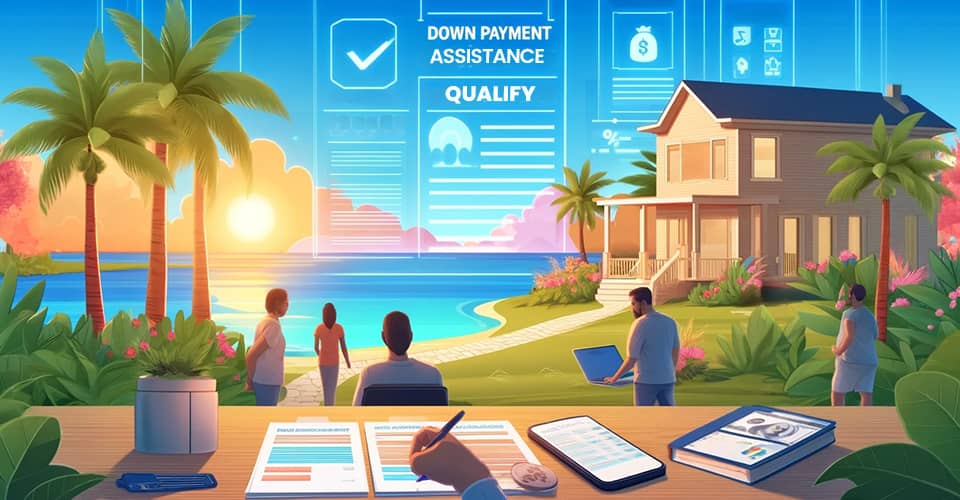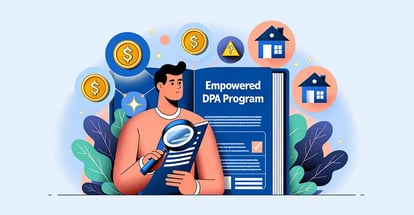How to Qualify for Down Payment Assistance in Florida
This blog will show you how to qualify for these programs, making it easier to own a home.
We'll cover all the down payment assistance programs in Florida, what kind of help they offer, and how to qualify for each.
Remember, you can use MakeFloridaYourHome to check if you're eligible for any of these programs.
Florida Hometown Heroes Program
The Florida Hometown Heroes Program supports working individuals across various professions in Florida, not just frontline workers like firefighters and police officers.
Its main goal is to make homeownership more accessible through financial assistance for down payments.
Due to high demand, the state has increased funding by $100 million for 2023-2024, raising the maximum down payment assistance from $25,000 to $35,000.
A key requirement of the program is that applicants buy homes in the communities where they work, strengthening local ties and potentially reducing commute times.
How to Qualify for Hometown Heroes
To qualify for the Florida Hometown Heroes Program, applicants must meet several criteria. The program is designed for first-time homebuyers, defined as individuals who have not owned a home in the last three years.
Applicants must demonstrate financial readiness with a minimum credit score of 640.
There are also income limits: applicants' income should not exceed 150% of the median income for their county, as set by the U.S. Department of Housing and Urban Development (HUD).
Employment is crucial for eligibility, requiring applicants to be actively employed by a Florida-based entity and the purchased home must be in the same community where the applicant works.
While these criteria establish eligibility, due to funding limitations and the program's popularity, fulfilling these requirements does not guarantee acceptance into the program.
Chenoa Fund Program
The Chenoa Fund Program is a national initiative designed to help individuals with financial constraints afford homeownership by providing down payment assistance.
The Chenoa Fund supports buyers by offering secondary financing options that include forgivable loans, repayable loans, and some with zero interest rates.
Tailored to meet various borrower needs, this program is particularly effective because it can be combined with FHA loans, offering a comprehensive solution for those lacking upfront capital to purchase a home.
How to Qualify for the Chenoa Fund
To qualify for the Chenoa Fund, applicants must meet specific criteria to ensure they truly need down payment assistance.
Prospective homebuyers should have a minimum credit score of 620 and a debt-to-income (DTI) ratio not exceeding 50% to demonstrate financial readiness.
Before receiving assistance, borrowers are required to complete a homeownership counseling session, which can be done online or in-person, to fully understand the responsibilities of homeownership.
Income limits are set at no more than 115% of the median income for the region where the home will be purchased. The property bought must be the buyer's primary residence.
Although primarily aimed at first-time homebuyers, the Chenoa Fund also offers products for repeat buyers.
However, applicants should carefully review the specific requirements and guidelines for the Chenoa product they are interested in, as these can vary.
Rocket Mortgage ONE+ Program
The ONE+ by Rocket Mortgage offers a unique solution for potential homeowners by requiring only a 1% down payment from the buyer, with Rocket Mortgage adding a 2% grant, thus giving the buyer an immediate 3% equity in their new home.
This program is inclusive, available to both first-time and repeat home buyers nationwide. A major benefit is the waiver of mortgage insurance, which lowers monthly payments and increases affordability.
For example, on a $250,000 property, a buyer would only need to contribute $2,500, while Rocket Mortgage provides an additional $5,000, reducing the buyer's initial expenses.
This is particularly advantageous compared to traditional loans that require mortgage insurance until 20% equity is reached, allowing users to save significantly over time.
How to Qualify for Rocket Mortgage ONE+
To qualify for the ONE+ program by Rocket Mortgage, applicants must meet specific criteria.
Firstly, an applicant's income should not exceed 80% of the median income for the area where they intend to buy. For example, if the median income in a county is $90,800, the income cap for eligibility would be $72,640. Fannie Mae offers a tool to check area median incomes.
Applicants must have a minimum FICO® Score of 620 and the property must be a single-unit primary residence. The combined total of the buyer's down payment and Rocket Mortgage's 2% grant should not exceed 5% of the home's value.
It's also important to differentiate between total income and qualifying income. If applicants meet the debt-to-income ratio (DTI) without considering bonus income or adding another borrower, such income does not need to be included in the qualifying income, offering greater flexibility in the qualification process.
FHA Loan Program
The FHA Loan Program, which allows for down payments of 3.5%, is aimed at helping prospective homeowners, particularly those who may not qualify for conventional loans.
A key feature of FHA loans is the low down payment requirement, which is typically less than that of conventional loans.
These loans are federally insured, which decreases the risk for lenders and allows them to provide more lenient qualification criteria.
Primarily, the FHA loan program seeks to promote homeownership across various income levels, focusing on first-time homebuyers and those without a substantial credit history or large down payment.
How to Qualify for an FHA Loan
Borrowers with a credit score of 580 or higher can make a down payment as low as 3.5% of the home's purchase price, while those with scores between 500 and 579 need to put down 10%.
This flexibility is particularly helpful for those who may find it challenging to save a large down payment but are financially ready to manage a mortgage.
FHA loans are more lenient with credit histories, allowing those with lower credit scores to still qualify by making a higher down payment.
The preferred debt-to-income ratio (DTI) is 43% or less, although in some cases, lenders may accept a higher DTI. These loans must be used for primary residences only, excluding investment properties and second homes.
Mortgage insurance is required for FHA loans to protect lenders against losses from defaults, which includes an upfront mortgage insurance premium (UFMIP) of about 1.75% of the loan amount that can be financed into the mortgage, and an annual premium that ranges between 0.45% and 1.05%, depending on the loan's terms.
VA Loan Program
The VA Loan Program, initiated in 1944 by the U.S. Department of Veterans Affairs, offers a specialized mortgage option for U.S. veterans, service members, and certain military spouses.
Its standout feature is the absence of a down payment requirement, making it highly appealing for military personnel. The federal government backs these loans, reducing lender risk and enabling the provision of favorable loan terms.
The primary goal of the VA loan program is to facilitate accessible and affordable homeownership for those who have served or are serving in the U.S. armed forces.
How to Qualify for a VA Loan
To qualify for a VA loan, applicants need a Certificate of Eligibility (COE) to confirm they meet the Department of Veterans Affairs' service requirements.
While there is no VA-mandated minimum credit score, lenders commonly prefer a score of 620 or higher. The recommended debt-to-income (DTI) ratio is 41%, though flexibility exists for compensating factors.
A funding fee is required, varying by the borrower’s service type and previous use of the benefit, although some veterans may be exempt.
Properties must also meet the VA's Minimum Property Requirements (MPRs) as assessed by a VA appraiser.
Conventional 97 Loan Program by Fannie Mae
The Conventional 97 loan program is a mortgage option offered by Fannie Mae, one of the two government-sponsored enterprises (GSEs) that buys and guarantees mortgages in the United States.
The primary feature of the Conventional 97 program is that it allows borrowers to make a down payment of just 3% of the purchase price, making it a feasible choice for first-time homebuyers or those without substantial savings.
The loan is geared towards standard conventional loans, but with a lower down payment requirement, thus facilitating more individuals to enter the homeownership realm.
How to Qualify for a Conventional 97 Loan
To qualify for a Conventional 97 mortgage, applicants must meet several requirements.
They need a credit score of at least 620 or 660, depending on the specific program guidelines. There are also income limits which may vary based on the property's location.
The property in question must be intended as the primary residence of the borrower. Typically, applicants are also required to complete a homebuyer education course.
Additionally, some Conventional 97 mortgages are specifically available to those who have not owned a home within the last three years.

20 More Florida Down Payment Assistance Programs and Grants
As of 2024 in Florida, first-time homebuyers can choose from 20 more (25 total) different programs that offer alternatives to the usual 20% down payment.
These programs provide cash grants, tax credits, and lower mortgage rates, helping those looking to buy their first home.
Keep in mind, each program has its own rules, but generally, you need to:
-
Be a first-time home buyer as defined by the program.
-
Complete a homebuyer education course.
-
Meet certain income and purchase price limits.
-
Buy a property in an approved area.
- Use the home as your primary residence.
Bottom Line - Which Program is Best for You?
Navigating the array of home loan programs can be daunting. Here’s a brief rundown tailored to specific homebuyer profiles based on the programs discussed:
Florida Hometown Heroes Program
Best suited for:
-
First-time homebuyers in Florida.
-
Working individuals who contribute significantly to their community.
- Those with a credit score of 640 or higher and who wish to buy within their community of employment.
Chenoa Fund Program
Best suited for:
-
Buyers who might struggle with the initial down payment.
-
Those with a credit score of 620 or higher.
- Both first-time and repeat homebuyers, depending on the specific Chenoa product.
Rocket Mortgage ONE+ Program
Best suited for:
-
Buyers wanting to start with a low down payment.
-
Those who would benefit from the absence of mortgage insurance.
- Both first-time and repeat homebuyers across the nation.
FHA Loan Program
Best suited for:
-
First-time homebuyers.
-
Individuals without an extensive credit history or a substantial down payment.
- Buyers with a credit score of 580 (for a 3.5% down payment) or between 500-579 (for a 10% down payment).
VA Loan Program
Best suited for:
-
U.S. veterans, service members, and select military spouses.
-
Buyers seeking no down payment and no private mortgage insurance.
- Those with a credit score of 620 or higher, although criteria might vary by lender.
Conventional 97 Loan Program by Fannie Mae
Best suited for:
-
First-time homebuyers or those returning to the market.
-
Buyers with a credit score of 620 or higher.
- Those who can manage a 3% down payment and are okay with PMI until they reach 20% equity.
Considering the unique features and requirements of each program, prospective homeowners should analyze their financial situation, long-term goals, and specific needs before deciding.
Always consult with a financial advisor or mortgage specialist like MakeFloridaYourHome to ensure the best fit.
With over 50 years of mortgage industry experience, we are here to help you achieve the American dream of owning a home. We strive to provide the best education before, during, and after you buy a home. Our advice is based on experience with Phil Ganz and Team closing over One billion dollars and helping countless families.

About Author - Phil Ganz
Phil Ganz has over 20+ years of experience in the residential financing space. With over a billion dollars of funded loans, Phil helps homebuyers configure the perfect mortgage plan. Whether it's your first home, a complex multiple-property purchase, or anything in between, Phil has the experience to help you achieve your goals.


 By
By  Edited by
Edited by 






